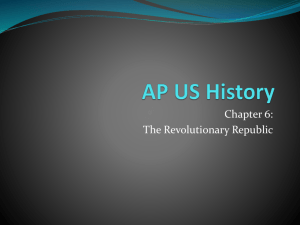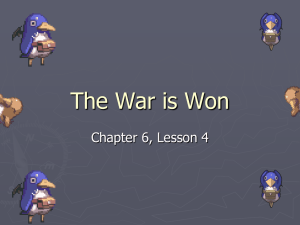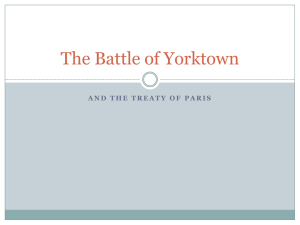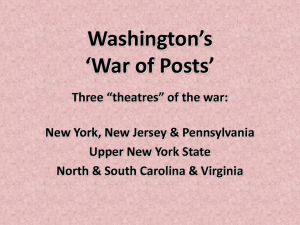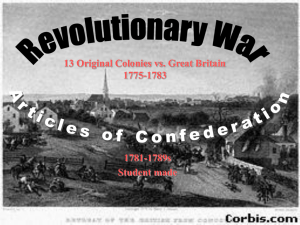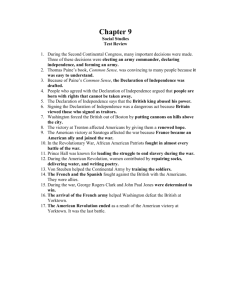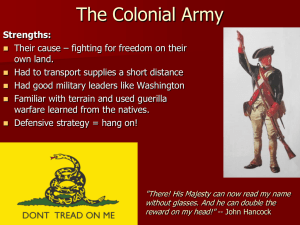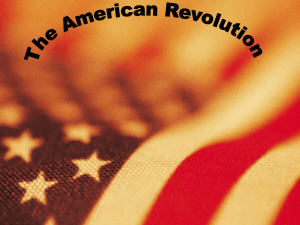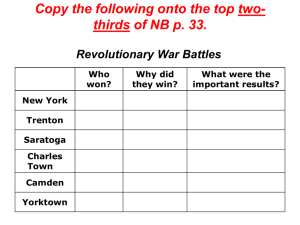Chapter 6 The War - shshistorydept.net
advertisement
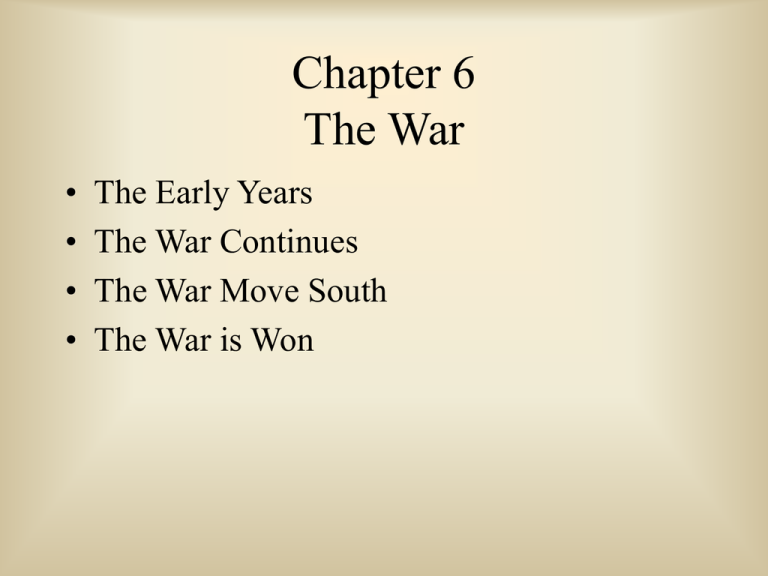
Chapter 6 The War • • • • The Early Years The War Continues The War Move South The War is Won The Early Years • Advantages and Disadvantages • Recruiting, Equipping, and Training an Army • An African American Presence • Won / Loss Column Advantages / Disadvantages • • • • • • American + Fighting on own land + Had a Cause for which to fight. + Washington - No Professional Army - Limited Financial Resources. - Divided Loyalties. • • • • • • British + Strong Navy + Larger Population + Well Trained Army + Deep Pockets - Long Distance - Will to Win Recruiting, Equipping, and Training an Army • Militia’s were locally recruited and trained – Different rules, regulations, and drills. – Elected officers and leaders • Congress Commissions a Regular Army – Enlistments of one year. – Low pay when paid – Training limited until after Valley Forge Exceedingly rare Master/Slave Enlistment Agreement from the Revolutionary War that allows Connecticut slave "Juba Negro" to join the Continental Army at half pay - Juba would gain his freedom as well, as during his service, he changed his name to "Juba Freeman." (June 2, 1777) African American Involvement In 1777, Washington approved the recruitment and training of African American Soldiers. The 1st Rhodes Island Regiment was formed and Commanded by Col Nicholas Green. Masters were paid 120 B.Pounds. Slaves were given ½ pay and later promised freedom. Win / Loss The War Continues • • • • • • European Support Winter at Valley Forge Lafayette Home Front. Glory at Sea The War Moves South European Support • Franklin and Adams as Ambassadors to France • After Saratoga Franklin secures France’s aid. Adams secures European loans. • In the beginning, France provides limited naval and ground support. The War Moves West and South • The war on the western frontier was mainly a war against the Native American Allies of the British. • General’s Clinton and Cornwallis move to separate the South from the Revolution. • Clinton returns to New York leaving Cornwallis in command. • The British win Force on Force Battles but cannot control the South because of Guerrilla tactics employed by the rebels. The War Moves West and South • Spanish Gov. of Louisiana opens the Port of New Orleans to the Colonists • Spain Declares war on Britain. • Colonial victories at Kings Mountain and at Cowpens solidify support for the Cause in the South. • Cornwallis retreats North to Yorktown after Guilford Courthouse. Events Leading Up to Yorktown and Independence July 1780 Rochambeau Lands with French Army in RI. April 1781 Cornwallis Retreats to Yorktown VA. August 1781 French Adm. deGrasse’s fleet become available to support operations. Q. Why would Cornwallis position his army on a peninsula? War Comes to a Close • After Yorktown, the British still held the key cities of Savannah, Charles Town, and New York. • The Surrender at Yorktown convinced the British that winning the war would be too costly. • Franklin, Adams, and John Jay secure independence with the Treaty of Paris 1783 Treaty of Paris 1783 • Britain recognizes the Independence of the United States of America. • fixed the boundaries of the United States. • granted Americans fishing rights off Newfoundland • provided that creditors of either side would be unimpeded in the collection of lawful debts. • provide for restitution of confiscated property to British subjects, and take no further proceedings against the Loyalists. (www.answers.com/topic/treaty-of-paris-1763) Prologue • Although the war was over, there were many more problems to solve. • The Army had to be paid and disbanded. – Newburgh Conspiracy – Officers threatened not to disband the army if demands were not met. – Washington quells the situation and convinces Congress to meet their demands. • November 1783 British finally leave New York and Washington resigns in December. Legacy of the Revolution • Life, Liberty, and the Pursuit of Happiness transcends National Borders and inspires the French Revolution, Revolts in Spanish Colonies . . .. • Are the ideals of the Revolution relevant in our world today?

